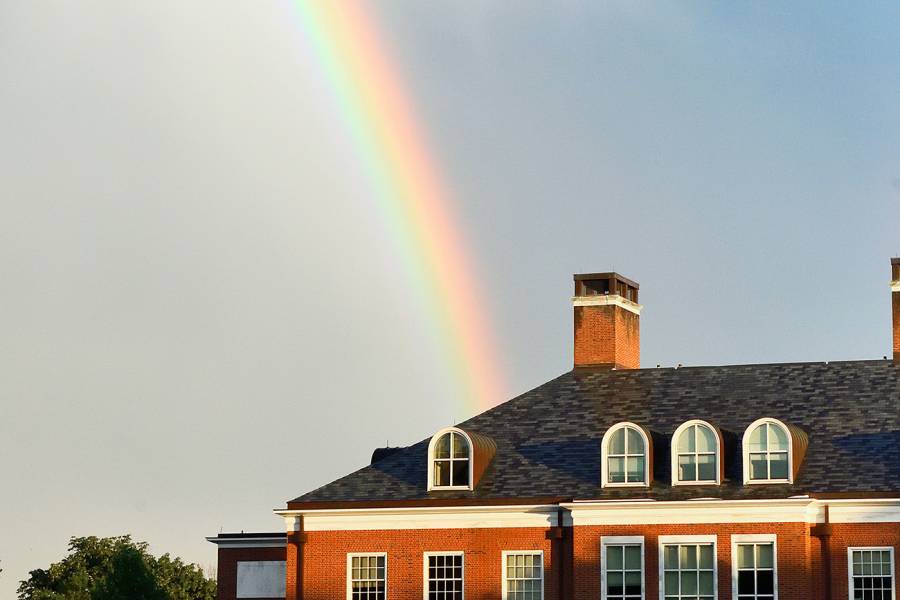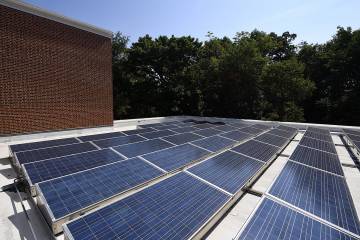This Earth Day, the Johns Hopkins Office of Sustainability is announcing plans to develop a new Sustainability Plan and roadmap, the first update to the university's environmental planning policy since the President's Task Force on Climate Change Implementation Plan was adopted in 2009.
The new Sustainability Plan will provide ambitious recommendations for strategies, goals, and metrics that advance university practices spanning operations and procurement, and its values and academic mission.
According to Julian Goresko, sustainability director at Johns Hopkins, the development of a new plan will include broad feedback from the university community and embrace a holistic view of sustainability that aligns the commitment with other core institutional priorities.

Image caption: Julian Goresko, sustainability director at Johns Hopkins, is leading the development of a new universitywide Sustainability Plan.
"This process serves as an opportunity for our community to develop a vision and pathways to addressing the urgency of climate and environmental action in the immediate and long term," said Goresko. "Our hope is this process will allow us to think about how we want to leverage the university's identity as a global leader in environmental teaching and research into an institutional vision for climate action and environmental stewardship."
The 2009 Climate Change Implementation Plan was created by the President's Task Force on Climate Change, which was formed in 2008 under former Johns Hopkins University President William R. Brody. The task force committed the university to a variety of strategies including reducing its greenhouse gas emissions by 51% by 2025.
The announcement for a new Sustainability Plan will build on the university's landmark climate commitment several years ahead of 2025. Beginning this month, as part of the 2019 signing of the largest solar agreement in the state of Maryland, the university began receiving renewable energy credits—a transferable certificate verifying that a certain amount of megawatt hours was generated through renewable energy sources—through its partnership with Constellation. Organizations use these credits as verification of their emissions reductions and to increase demand for energy from renewable sources. By retiring these credits, Johns Hopkins will meet its greenhouse gas reduction goal over the course of the coming year.
"This milestone of a solar agreement complements our work in demand-side energy efficiency and ensures that over 80% of our purchased electricity comes from clean, renewable power and will allow us to meet the university's goal of reducing our greenhouse gas emissions by 51% several years ahead of schedule," said Bob McLean, vice president of facilities and real estate.
Goresko said that the university's focus on sustainability and climate change has become even more pronounced since the development of the Climate Change Implementation Plan and has included the 2019 launch of the Sustainability Leadership Council, which reports to Provost Sunil Kumar. The new plan will examine priorities for the university including thematic areas of:
- Health: Align the university's academic reputation and environmental practice, while merging a vision for sustainability and public health.
- Equity: Highlight areas of environmental justice that Johns Hopkins can address through its efforts, particularly in both local and global vulnerable communities.
- Research: Strengthen interdisciplinary sustainable research, influence operational thinking through research-based campus-as-lab initiatives, and ensure that science-based targets serve as a critical lens for strategy and goal development.
- Regional Leadership & Alignment: Engage and align with key efforts of Baltimore City and Washington D.C. to ensure complementary environmental objectives.
Over the next year, the university will solicit stakeholder and student feedback, critically explore proposed ideas, and finalize a new plan by the end of summer 2022.
Posted in University News
Tagged sustainability, energy, office of sustainability









